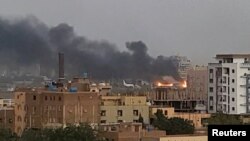Forces loyal to Gen. Abdel-Fattah al-Burhan, head of the army and leader of Sudan's ruling council, and his deputy on the council Gen. Mohammed Hamdan Dagalo, head of the Rapid Support Forces (RSF) paramilitary group, have been battling since Saturday, increasing the risk of a nationwide civil war.
Both men, each with tens of thousands of troops deployed just in the capital of Khartoum, vowed not to negotiate or cease-fire, despite mounting global diplomatic pressure.
Here's a look at what's behind the fighting.
What triggered the violence?
Tension had been building for months between Sudan's army and the RSF, which together toppled a civilian government in an October 2021 coup.
The friction was brought to a head by an internationally-backed plan to launch a new transition with civilian parties. A final deal was due to be signed earlier in April, on the fourth anniversary of the overthrow of long-ruling autocrat Omar al-Bashir in a popular uprising.
Both the army and the RSF were required to cede power under the plan, but disagreements arose over the timetable for integration and when the army would be formally placed under civilian oversight.
When fighting broke out on April 15, both sides blamed the other for provoking the violence.
Since then, the military and the RSF have battled each other with heavy weapons, including armored vehicles and truck-mounted machine guns, in densely populated areas of the capital and the adjoining city of Omdurman. The military has pounded RSF bases with airstrikes.
More than 180 people have been killed and over 1,800 wounded since the fighting erupted, U.N. envoy to Sudan Volker Perthes said.
The clashes have spread to other areas in the country, including the strategic coastal city of Port Sudan on the Red Sea and eastern regions. Fighting was also reported in the war-wrecked Darfur region, where U.N. facilities were attacked and looted. The U.N. says three employees with the World Food Program (WFP) were killed in the clashes there on Saturday, leading the agency to halt operations.
Who are the main players?
The protagonists in the power struggle are Burhan and Dagalo, commonly known as Hemedti.
As the plan for a new transition developed, Hemedti aligned himself more closely with civilian parties from a coalition, the Forces for Freedom and Change (FFC), that shared power with the military between Bashir's overthrow and the 2021 coup. Diplomats and analysts say this was part of a strategy by Hemedti to transform himself into a statesman.
Both the FFC and Hemedti stressed the need to sideline Islamist-leaning Bashir loyalists and veterans who had regained a foothold following the coup and have deep roots in the army.
Along with some pro-army rebel factions that benefited from a 2020 peace deal, the Bashir loyalists opposed the deal for a new transition.
In Sudan, the military controls most of the country's economy, but the RSF runs major gold mining areas, a key source of income for the powerful group.
Though Sudan's army has superior resources including air power, the RSF expanded into a force estimated at 100,000 men that had deployed across Khartoum and its neighboring cities as well as in other regions.
What's at stake?
The popular uprising had raised hopes that Sudan and its population of 46 million could emerge from decades of autocracy, internal conflict and economic isolation under Bashir.
Conflict could not only destroy those hopes but destabilize a volatile region bordering the Sahel, the Red Sea and the Horn of Africa.
It could also play into competition for influence in the region between Russia and the United States, and between regional powers who have courted different actors in Sudan.
What are the prospects for a cease-fire?
The prospects for an immediate cease-fire appear to be slim. Burhan and Hemedti have dug in, demanding that the other surrender. The intense nature of the fighting also might make it harder for the two generals to return to negotiations.
On the other hand, the military and the RSF both have foreign backers, who unanimously appealed for an immediate halt to hostilities.
The Muslim religious calendar might also play a role. The fighting erupted during the last week of the Islamic holy month of Ramadan, with the three-day holiday of Eid al-Fitr marking the end of the fasting month later this week. The population is increasingly strained for necessities, many homebound by the violence.
Meanwhile, there has been a flurry of diplomatic contacts. The U.N. Security Council is scheduled to discuss Sudan on Monday.
Who are the foreign actors?
After Bashir's ouster, the United States and European nations began competing with Russia for influence in Sudan, which is rich in natural resources, including gold, but has been mired in civil conflicts and military coups. In recent years, the Russian mercenary outfit Wagner has even made inroads in the country.
Burhan and Hemedti have also forged close ties with Saudi Arabia and the United Arab Emirates. Sudanese troops drawn from the military and the RSF have fought alongside the Saudi-led coalition in Yemen’s long-running civil war.
U.S. Secretary of State Antony Blinken said he discussed the developments in Sudan with the foreign ministers of Saudi Arabia and the United Arab Emirates. The Saudi foreign minister said he spoke separately by phone with Burhan and Hemedti, and urged them to stop "all kinds of military escalation."
Egypt, another regional power, also has deep ties with the Sudanese military. The two armies conduct regular war games, most recently this month. Egyptian troops were in a Sudanese military base for exercises when the clashes erupted Saturday. They were caught by the RSF which said they would be returned to Egypt.
Information for this report came from Reuters and The Associated Press.
